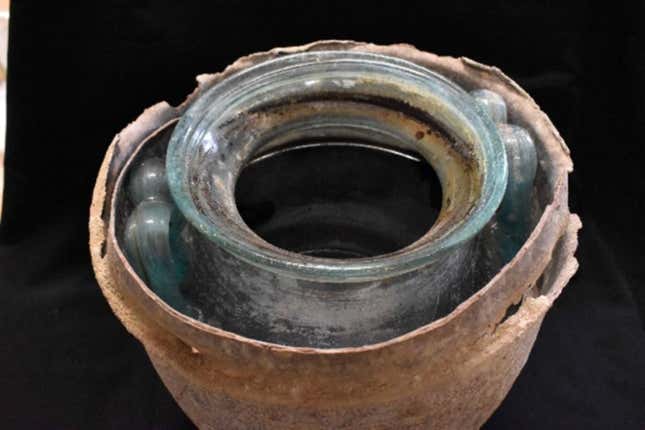ARTICLE AD
Raise your glasses—and your eyebrows: A team of archaeologists has found the oldest liquid wine in a Roman mausoleum in Spain. The team determined it was a white wine, reddened by centuries of chemistry, and muddled with the cremated remains of a Roman man. Delicious.
Automation Never Tasted So Good
The urn was found in a tomb in Carmona, southern Spain, in 2019. Now, the results of the archaeochemical study of the liquid inside the urn has been published, yielding the superlative viticultural significance of the stuff. The team’s research was published this week in the Journal of Archaeological Science.
The team confirmed the mystery liquid was wine by identifying its polyphenols, which are biomarkers found in wines. It yielded seven polyphenols that are present in modern wine-making regions in Spain. But a missing polyphenol—syringic acid—led the team to conclude the wine was, in its day, a white. Ignore the brownish-red color. That just means it’s well-aged and mixed with the ashes of the dead.
The liquid’s pH was 7.5, much higher than wines produced in the region today. The pH of the liquid is likely due to the “strong decay from the potential wine it once was,” the authors wrote. Overall, the liquid’s mineral profile was similar to the sherry wines from Jerez, in Andalusia, as well as several types of fino wines.

The researchers found more potassium (K) abundance in the wine than is present in current wines, though the researchers claim that may be due to the presence of cremated remains in the urn, too. Forget dying of drink—one ancient Roman appears to have been interred in it.
According to a University of Cordóba release, the remains in the urn were male for a reason; in ancient Rome, women were prohibited from drinking wine, a gender divide that carried through to Roman Spain. An urn containing female remains was also found in the mausoleum, but did not contain wine; in lieu of mystery liquid, the woman’s urn held several amber gemstones, a bottle of perfume, and the remains of silk fabrics.
Importantly, this is the oldest liquid wine ever found. That doesn’t mean it’s safe to drink, but it’s significantly easier to consume than older wine-related archaeological findings, in which the alcoholic liquids are typically dried up, leaving only wine compounds. Such was the case in 2017, when a different team of scientists found the oldest evidence of grape wine-making in 8,000-year-old pottery fragments from Georgia. People have been making wine since well before Roman times, but it’s rare for the stuff to stay wet over the millennia.
The team could not determine the exact grape variety used to make the white wine, making it impossible to identify the specific type of white wine. However, maybe someone with a very refined palette could give it a taste. Just remember: human tastes of chicken tannins.
More: Archaeologists Unearth a Fanciful Ancient Winery Near Rome

 7 months ago
45
7 months ago
45 

